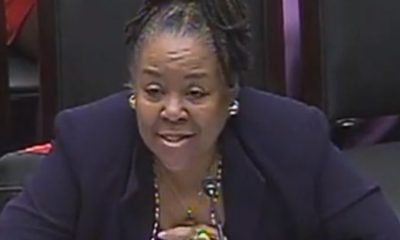Black History
Women’s Suffrage Forged by Founding Sisters: Happy Birthday to Ida B.
CHARLESTON CHRONICLE — So proclaimed Ida B. Wells-Barnett, who fearlessly shined a light with words on the abominable dark days after slavery and into the 20th century. Journalist, publisher, author, activist, and suffragist leader, Ida B.’s spirit soars. July 16 marks the 157th anniversary of her birth. Blood, sweat, and ink sealed her legacy and the future of a nation still struggling to be whole.
 By Gwen McKinney
By Gwen McKinney
“The people must know before they can act, and there is no educator to compare with the press.”
So proclaimed Ida B. Wells-Barnett, who fearlessly shined a light with words on the abominable dark days after slavery and into the 20th century.
Journalist, publisher, author, activist, and suffragist leader, Ida B.’s spirit soars. July 16 marks the 157th anniversary of her birth. Blood, sweat, and ink sealed her legacy and the future of a nation still struggling to be whole.
Ida B. revered the Black press as an organizing tool. Though her newspaper The Memphis Free Speech was destroyed by racist mobs, she was never silenced. During her life, she would publish three newspapers and authored “Southern Horrors: Lynch Law in All Its Phases” and “The Red Record,” investigative reports that remain definitive sources on racist violence more than 100 years later.
Small in stature but huge in courage, Wells, an emancipated slave, joined a cadre of Black contemporaries – scholars, activists, and thought leaders – who pledged to change the trajectory of bondage and demand that Black women have a voice.
They defy the clichés and caricatures planted in popular culture with their searing voices. Their cadence would not be paraphrased or translated into the often quoted “Ain’t I A Woman” reprise. But forever burdened by their womanhood and Blackness, their path – then and now – is littered with obstacles.
Educator and writer Mary Church Terrell observed, “Nobody wants to know a colored woman’s opinion about her own status [or] that of her group. When she dares express it, no matter how mild or tactful…, it is called ‘propaganda,’ or is labeled ‘controversial.’”
Poet, teacher, and Baltimore abolitionist Frances Ellen Harper was among the suffragists who pleaded the case for linked fate unity. “We are all bound up together in one great bundle of humanity,” she said. “Society cannot trample on the weakest and feeblest of its members without receiving the curse in its own soul.”
These Founding Sisters forged civil rights organizations with Black men, sororities, and service clubs with their women peers, and joined “woke” White women against lynching and disenfranchisement and for education and economic development.
It was Ida B. and a coterie of Black women publishers, writers, and teachers of the era who led the movement for universal suffrage even when Black women were shunned and excluded.
Nonetheless, women’s suffrage, deeply rooted in abolitionism, is depicted in a single dimension as the jumpstart for the white feminist/voting rights movement.
Regarded as social reformers, White suffragist – many of them supporters of abolition – confronted a fork in the road, conflicted between the “Negro question” and universal suffrage.
With passage of the 15th Amendment in 1870 granting Black men voting rights, universal suffrage would be sacrificed on the altar of patriarchy and white supremacy. Defended or oversimplified, the words of Susan B. Anthony, crowned the mother of women’s suffrage, illustrate the entrenched stranglehold of whiteness.
Though she counted abolitionist Frederick Douglas as an admired cohort, Anthony’s contradictions can only be measured today in the context of racism and exclusion.
“I would sooner cut off this right arm of mine before I would ever work for or demand the ballot for the black man and not the woman,” she said. One might conclude that she was seduced by the divide-and-conquer tactics of the male proponents of the 15th Amendment. But Anthony’s view was widely embraced by the White women’s suffrage movement.
Her friend and suffrage leader Elizabeth Cady Stanton, arguing against the 15th Amendment, protested: “It’s better to be the slave of an educated white man than of a degraded black one.”
One year away from the centennial of the 19th Amendment giving women the right to vote, how much ground have we gained as women and a nation? How much of the conversation about gender equality denies the overlapping impact of white nationalism, patriarchy, and privilege? Where and when do the voices of Black and Brown women enter?
But first and foremost, when do Black women get the recognition that they have earned in their unbroken march to freedom?
Our compass should be guided by that path forged by Ida B. Wells and other courageous Black women whose intersectional quest to make America stand upright changed the world.
This opening salvo embraces Suffrage. Race. Power. Spurred by my collaboration with a small collective of women that is Black-led, cross-generational, and supported by “woke” White women, we’ve named ourselves “Founding Sisters.” This space will offer regular installments that honor our Founding Sisters of the last centuries and spotlight the unfinished business of Suffrage. Race. Power.
To kick it off: Happy birthday Ida B.!
Gwen McKinney is President and Founder of McKinney & Associates Public Relations, for which she is responsible for translating the vision of “public relations with a conscience” into a sustained, bold and tested suite of communications services and activities. She is also the founder and lead collaborator for Suffrage.Race.Power.
This article originally appeared in the Charleston Chronicle.
Activism
Oakland Post: Week of April 24 – 30, 2024
The printed Weekly Edition of the Oakland Post: Week of April 24 – 30, 2024

To enlarge your view of this issue, use the slider, magnifying glass icon or full page icon in the lower right corner of the browser window. ![]()
Activism
Oakland Post: Week of April 17 – 23, 2024
The printed Weekly Edition of the Oakland Post: Week of April 17 – 23, 2024

To enlarge your view of this issue, use the slider, magnifying glass icon or full page icon in the lower right corner of the browser window. ![]()
Black History
Matthew Henson: Explorer Extraordinaire
Matthew Henson, a trailblazing explorer who overcame countless obstacles to leave an incredible mark on history. Born on August 8, 1866, in Charles County, Maryland, his journey is a testament to the power of determination and the spirit of adventure.

By Tamara Shiloh
Matthew Henson, a trailblazing explorer who overcame countless obstacles to leave an incredible mark on history. Born on August 8, 1866, in Charles County, Maryland, his journey is a testament to the power of determination and the spirit of adventure.
Henson’s life began amidst the backdrop of post-Civil War America, where opportunities for African Americans were scarce. From a young age, he possessed an insatiable curiosity about the world beyond his small town. At the age of 12, he embarked on a journey that would change the course of his life forever when he joined a merchant ship as a cabin boy.
His most famous expedition was his journey to the Arctic with renowned explorer Robert E. Peary. In 1887, Henson joined Peary’s crew as a seaman and quickly proved himself to be invaluable with his skills as a navigator and craftsman. Over the course of several expeditions, Matthew endured extreme cold, treacherous terrain, and grueling conditions as he and Peary sought to reach the elusive North Pole.
In 1908–09, Peary set out on his eighth attempt to reach the North Pole. It was a big expedition, with Peary planning to leave supplies along the way. When he and Henson boarded their ship, the Roosevelt, leaving Greenland on August 18, 1909, they were joined by a large group. This included 22 Inuit men, 17 Inuit women, 10 children, 246 dogs, 70 tons of whale meat, blubber from 50 walruses, hunting gear, and tons of coal.
In February, Henson and Peary left their anchored ship at Ellesmere Island’s Cape Sheridan, along with the Inuit men and 130 dogs. They worked together to set up a trail and supplies along the way to the Pole.
Peary picked Henson and four Inuit people to join him in the final push to the Pole. However, before they reached their destination, Peary couldn’t walk anymore and had to ride in a dog sled. He sent Henson ahead to scout the way. In a later interview with a newspaper, Henson recalled being in the lead and realizing they had gone too far. The group turned back, and Henson noticed his footprints helped guide them to their destination. At that location, Henson planted the American flag.
Henson’s legacy extends far beyond his expeditions to the Arctic. He shattered racial barriers in the world of exploration and inspired countless individuals, regardless of race, to dream big and pursue their passions. In 1937, he was finally recognized for his achievements when he was inducted into The Explorers Club, an organization dedicated to promoting scientific exploration and field research.
Matthew Henson died in the Bronx, New York, on March 9, 1955, at the age of 88.
-

 Activism4 weeks ago
Activism4 weeks agoOakland Post: Week of March 27 – April 2, 2024
-

 #NNPA BlackPress4 weeks ago
#NNPA BlackPress4 weeks agoBeloved Actor and Activist Louis Cameron Gossett Jr. Dies at 87
-

 Community1 week ago
Community1 week agoFinancial Assistance Bill for Descendants of Enslaved Persons to Help Them Purchase, Own, or Maintain a Home
-

 Activism3 weeks ago
Activism3 weeks agoOakland Post: Week of April 3 – 6, 2024
-

 Business1 week ago
Business1 week agoV.P. Kamala Harris: Americans With Criminal Records Will Soon Be Eligible for SBA Loans
-

 Activism2 weeks ago
Activism2 weeks agoOakland Post: Week of April 10 – 16, 2024
-

 Community1 week ago
Community1 week agoAG Bonta Says Oakland School Leaders Should Comply with State Laws to Avoid ‘Disparate Harm’ When Closing or Merging Schools
-

 Community6 days ago
Community6 days agoOakland WNBA Player to be Inducted Into Hall of Fame


























































2 Comments